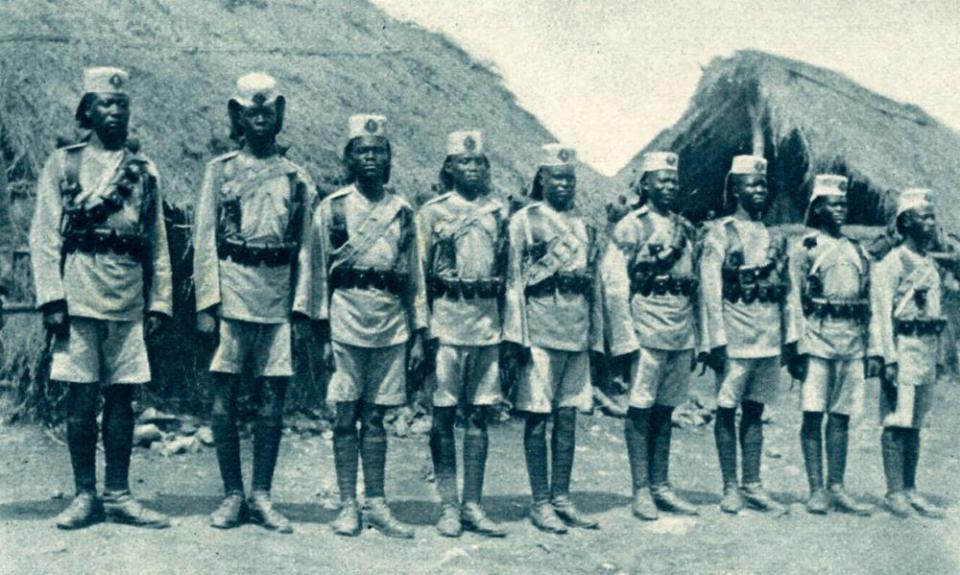This war graves report shows Britain must face its colonial past with honesty

Walking around the Voi cemetery in southern Kenya a couple of years ago while filming a documentary for Channel 4, I read the names of British captains and corporals who died in the country in the first world war and paid my solemn respects.
I then asked the caretaker where the bodies of the Africans who also served Britain were buried. He pointed into the distance, behind the fence of the neatly-kept grounds into the bush, where dogs pee next to discarded plastic bags, bottles and other bits of miscellaneous rubbish. There was no headstone, no memorial and no dignity to be found in their deaths.
As the Commonwealth War Graves Commission finally admits today, up to 54,000 casualties, from Indian, east African, West African, Egyptian and Somali units were treated with unequal dignity in death. Some were commemorated collectively on memorials, instead of being given individually marked graves like their European counterparts. Others had their names recorded on registers, rather than in stone. As many as 350,000, mainly east African and Egyptian, personnel who fought for Britain were not commemorated by name. Some of them were not commemorated at all.
The logic for this outrage was explained by Gordon Guggisberg, the governor of the Gold Coast (now Ghana), who wrote in 1923: “The average native of the Gold Coast would not understand or appreciate a headstone.” A War Graves Commission document refers to African soldiers and carriers as “semi-savage”. Another states “they are hardly in such a state of civilisation as to appreciate such a memorial”, and “the erection of individual memorials would represent a waste of public money”.
As an organisation that prides itself on “equality in death” it’s difficult to imagine what the reaction of the Commonwealth War Graves Commission would be if it discovered that hundreds of thousands of white soldiers who fought for Britain were buried without graves. However, it is to be welcomed that the organisation now admits that the decision to exclude Black and Brown soldiers from equal commemoration was underpinned by “the entrenched prejudices, preconceptions and pervasive racism of contemporary imperial attitudes”.
No condolences can ever make up for the indignity suffered by the unremembered. No headstone erected today can fill the empty void of the century that has passed in which these people were viewed as superfluous. Nevertheless, the commission’s apology and commitment to implement the recommendations of the report does offer the opportunity for us as a nation to take a fresh look at our collective history.
When we think of the first world war, we think of the interminable trenches of the western front. We think of the battles of the Somme, Mons and Passchendaele. We think of wartime poets like Wilfred Owen, Siegfried Sassoon and Rupert Brooke. We do not think of the first shot fired by a British soldier, Regimental Sergeant-Major Alhaji Grunshi of the Gold Coast, during the Anglo-French invasion of Togoland (now Togo), which was then a German colony. When we think of the end of the first world war, we think of the armistice of 11 November 1918, forgetting that conflict continued between German and British troops in east Africa for a further two weeks.
Whenever there is debate around decolonising the curriculum, there is a false assumption that those arguing for it are focused on removing what we do not like. This could not be further from the truth. We don’t want to erase history. We want to tell it honestly. Until we are able to do this, we will be unable to properly understand the present.
Wilful ignorance of Britain’s colonial past in part explains the refusal by Boris Johnson’s government to accept the existence of institutional racism in modern Britain. The government’s Sewell report, denounced by the UN, described the belief in institutional racism in the UK as being a product of “idealism” from young people. There can be no clearer evidence than this report that, in fact, the refusal to accept the existence of institutional racism is a product of ignorance.
There is not only one injustice in this story. The first is clear: hundreds of thousands of Black and Brown soldiers who died for Britain were not given the graves, memorials or commemoration that they deserved. The second is that it took so long for this travesty to be recognised, let alone corrected. It should not have taken me to present a TV documentary for action to be taken or for apologies to be made. The research that The Unremembered was based on was completed by academic Michèle Barrett a decade previously, but it was ignored. This fact reflects poorly on the Commonwealth War Graves Commission, but it is typical of so many institutions in this country that are reluctant to see prejudice even when it is staring them in the face.
Let this teach us a lesson: we cannot hide from the worst parts of our history if we want to move forward as a nation. As Martin Luther King Jr once said: “The arc of the moral universe is long, but it bends toward justice.”
David Lammy is the Labour MP for Tottenham

 Yahoo Finance
Yahoo Finance 